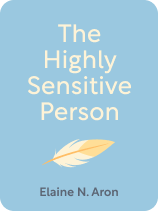

This article is an excerpt from the Shortform book guide to "The Highly Sensitive Person" by Elaine Aron. Shortform has the world's best summaries and analyses of books you should be reading.
Like this article? Sign up for a free trial here.
What is Elaine Aron’s The Highly Sensitive Person about? What is the key message to take away from the book?
If you often find yourself needing to duck out of parties early, covering your ears at loud concerts, or crying at sentimental commercials on television, you might be a highly sensitive person. In her book The Highly Sensitive Person, Elaine Aron explains the trait of high sensitivity.
Below is a brief overview of The Highly Sensitive Person by Elaine Aron.
The Highly Sensitive Person: How to Thrive When the World Overwhelms You
In her book The Highly Sensitive Person, Elaine Aron explains how HSPs, or highly sensitive people, can use their sensitivity to their advantage and manage the difficult aspects of their trait. A highly sensitive person is someone who experiences a higher degree of sensitivity than the average person. HSPs often have high empathy, an ability to process things more deeply and discern subtleties, and a tendency to become overstimulated. She argues that this trait isn’t inherently good or bad, but that the HSP plays a vital role in society. She also discusses how to navigate the world as an HSP since many aspects of our society are geared toward the non-HSP majority.
Elaine Aron is a psychotherapist who has been studying high sensitivity since 1992. She is the author of many other books about HSPs, including The Highly Sensitive Child and The Undervalued Self. She is an HSP herself.
In our guide, we’ll examine the positive and negative traits of the highly sensitive person and their evolutionary origins. We’ll also discuss different ways to manage them in your personal, social, and professional life, and how to treat negative symptoms that may accompany high sensitivity. We’ll also look at advice from other experts on how to use your strengths as an HSP and manage the difficulties it entails, and we’ll contextualize Aron’s advice in the broader field of psychology and social science.
What Does It Mean to Be a Highly Sensitive Person?
High sensitivity is a trait characterized by higher levels of sensitivity than are usually found in the general population, writes Aron. About one-fifth of people are highly sensitive. There are four major characteristics of an HSP:
1) The ability to process information very deeply
2) The ability to discern subtleties better than the average person
3) A high level of empathy and strong emotions
4) A tendency to become overstimulated.
We’ll examine the first three in this section, and we’ll look at overstimulation in the following section.
(Shortform note: Aron acknowledges that there is overlap between autism and the HSP trait but asserts that they are different. However, some experts argue that the HSP trait is just a specific way that autism can present, as both include things like high sensory sensitivity, having a rich inner life, and having intense reactions to beauty and art. They suggest that the main distinction made between HSPs and autistic people is the level of accommodations they need and that this isn’t a significant enough difference to classify the two as separate conditions.)
Deep Processing: According to Aron, being able to process information more deeply means HSPs can often concentrate intensely for long periods of time, especially when they’re in a distraction-free environment. They also tend to engage in metacognition, or thinking about their own thinking and learning. This deeper processing often takes longer than a more shallow level of processing, which can make it seem like HSPs are slower learners than non-HSPs. But once they’ve processed information fully, HSPs usually have a better understanding and better retention of what they’ve learned.
(Shortform note: Research shows that practicing metacognition improves learning and memory, and it also helps students understand how they learn best. While metacognition may come more intuitively to HSPs, it’s a skill that anyone can cultivate, especially with the guidance of a teacher or expert. If you want to train yourself to have deeper processing skills, set aside extra time when you’re learning something new to practice metacognition and reflect on your thinking and learning.)
Deep processing also means that HSPs are particularly skilled at using past experiences to inform decisions in the present, explains Aron. By recognizing that they’ve already learned how to deal with a situation like the one they’re in presently, HSPs can often react to danger or take advantage of opportunities more quickly than non-HSPs, giving them strong intuition. However, with less urgent decisions, HSPs may take longer to make their choice than non-HSPs because they consider all their options so meticulously.
(Shortform note: Research suggests that the speed with which someone makes a decision may impact how others view that decision. Making a decision quickly makes you appear more certain than if you make it slowly, and if that decision is a positive one—like deciding to distribute bonuses to your staff—a quick decision is viewed more favorably than a slow one. On the other hand, a slow negative decision is viewed more favorably than a quick negative decision—like deciding there’s not enough money in the budget for bonuses. If you have to make a decision that’s not going to be received well, think slowly and deliberately both to ensure you’re choosing the best option and to make it clear to others that you didn’t take the decision lightly.)
Attention to Subtleties: Aron also states that HSPs have a keen eye for subtle details that might go unnoticed by non-HSPs. This usually makes them very good at spotting and avoiding mistakes, and they remember mistakes more clearly so they can spot them more easily in the future. They can also be especially good at tasks requiring high alertness, accuracy, and attention to detail.
(Shortform note: This keen eye for detail can be highly beneficial in the workplace. Picking up on subtleties that others miss can help you catch others’ mistakes quickly, and tactfully pointing these mistakes out for the sake of team or project improvement can make you stand out to your boss as a skillful team player.)
High Empathy and Emotionality: HSPs also have intense empathy for others, says Aron. This means that they can be deeply affected by the moods and emotions of others, and because of their intuition and eye for detail, they tend to be more aware of these moods and emotions as well.
(Shortform note: While empathy can be a highly beneficial trait, it becomes a problem if your empathy overpowers your ability to take care of your own emotional needs, an issue called toxic empathy. To avoid becoming overwhelmed by others’ emotions, maintain boundaries and be conscientious of how much of yourself you are devoting to accommodating other people’s feelings. Also, make sure you are receiving empathy from others in return. You can also try to turn your feelings of empathy into action by asking the other person how you can help rather than simply feeling their feelings with them.)
HSPs are also more likely to experience intense emotions themselves. They tend to have strong consciences and senses of justice, and Aron says they’re prone to experiencing intense feelings of awe, which can be deeply meaningful and joyful—though it may also contribute to overstimulation, which we will examine in the next section.
(Shortform note: HSPs’ strong senses of justice can make them excellent activists, as they often feel an intense desire to help when they see others in pain or struggling. However, since the activities involved with activism—such as marching, protesting, and speech-making—can be highly stimulating, it’s important to avoid straying too far outside your comfort zone for too long. Some methods of activism that might appeal more to HSPs include writing letters, donating to charitable causes, and directing others to educational and artistic resources to help them better understand injustices.)
Aron lists some other characteristics that many—but not all—HSPs have:
- They’re good at fine motor skills.
- They’re highly creative.
- They’re morning people.
- They’re more sensitive to substances like caffeine, alcohol, and medications.
(Shortform note: Note that you don’t have to have all these traits to be an HSP. In fact, many HSPs struggle with getting up in the mornings, and HSPs who also have conditions like ADHD may have impaired motor skills. In addition to these traits, other experts suggest HSPs are more likely to be people pleasers and to suffer from imposter syndrome because they are so attuned to others’ feelings and perceptions.)
Where Does High Sensitivity Come From?
HSPs have existed throughout all of recorded history. Aron says high sensitivity probably developed as an evolutionary survival trait. Individuals who were more attuned to their environment and who were more likely to pause, take in their surroundings, and think through their actions gained a survival advantage and were able to help their groups survive better as well. Their tendency to learn from past experiences to inform their future actions also provided a survival advantage to themselves and their groups.
(Shortform note: Aron has added in other writing that HSPs were not only responsible for the survival of the human species in the past but are also essential for our survival in the future. She argues that HSPs are needed to observe and reflect on the actions of aggressive world leaders and to guide the species to choose cooperation over competition, which may become even more vital than it was during our earlier evolution.)
Aron says in all higher animal species, there are individuals that show traits of high sensitivity, but they make up a minority of the population. Aron suggests this is because there are also some disadvantages, such as a tendency to overgeneralize past experiences—for example, if they got sick from eating a type of berry once, they might avoid that berry from then on. But if the sickness was a coincidence then they’re missing out on a useful source of nutrition.
(Shortform note: Other species can also have highly sensitive individuals—for example, dogs. As with humans, a dog’s sensitivity can impact its behavior and personality. Highly sensitive dogs are more reactive to negative communication and punishment and may need calmer environments than other dogs. Highly sensitive people often do well with pets, but consider whether you’re attending to your dog’s sensitivity needs as well as your own. Behavior problems may be a sign that your HSD—highly sensitive dog—is overstimulated.)
Aron describes a distinction between two classes of people throughout history: people like warriors and conquerors who sought expansion and competition, and people like advisors, judges, and priests whose sensitivity allowed them to act as the voice of caution, often reining in the aggressive tendencies of the other class. She suggests that those of the conqueror class were more likely to die because of their boldness and tendency to act quickly, and that’s why we evolved to have more of them than people of the sensitive class.
(Shortform note: While the less sensitive class of people may be more likely to die from risky actions they take, research suggests that highly sensitive people may be more susceptible to suicidal ideation and death from suicide. This may not have a significant statistical impact on the ratio of HSPs to non-HSPs but may reflect the ways in which life is difficult for them in different ways than it is for non-HSPs.)
How an HSP’s Environment Affects Their Trait
As we’ve discussed, high sensitivity is passed down genetically and is an inherent trait. However, while it can’t be cultivated or developed, your environment can impact your sensitivity, and a particularly difficult life and childhood can make you suppress your sensitivity until you seem to not have it anymore.
(Shortform note: While suppressing your sensitivity and emotions in the short term can protect you from painful conflict and make you appear more resilient, in the long run, it can harm your physical and mental health and even weaken your immune system, making you more prone to illness.)
HSPs tend to be more affected by their childhood experiences in general. HSPs with poor childhood experiences tend to have poorer life outcomes than non-HSPs with poor childhood experiences, while HSPs with positive childhood experiences often have better outcomes than non-HSPs with positive childhood experiences. This suggests that while sensitivity is an inborn trait, its impact on our lives is largely dependent on environment, especially in childhood.
(Shortform note: Some research suggests that high sensitivity in children may cause strain in their relationships with their parents, especially if the parent is unaware of the child’s sensitivity. Parents should do their best to educate themselves about their child’s needs so they can accommodate their sensitivity and avoid unnecessary conflicts that may contribute to poorer outcomes for the child.)
The Drawback of Being a Highly Sensitive Person: Overarousal
While high sensitivity can come with great strengths, according to Aron, the only distinctly negative one of the four major traits of the HSP is the tendency to become overstimulated. HSPs are more sensitive to sensory stimuli, which makes them more susceptible to sensory overload due to overarousal.
According to Aron, arousal is the nervous system’s natural response to stimuli. It affects everyone differently, and it’s not necessarily good or bad. Everyone, HSP or not, functions best when they’re neither overaroused nor underaroused.
(Shortform note: To reduce the risk of experiencing sensory overload, it’s important to know what stimuli make you feel overwhelmed so you can avoid or minimize them. If you struggle in large crowds, for example, try arranging your schedule so you only have to be in public at times when there are fewer people out. Other helpful strategies include having a safe space you can go to when feeling overwhelmed, carrying sensory-reducing tools like earplugs or sunglasses, and getting enough rest so your sensory threshold is higher.)
However, stimulation affects HSPs more profoundly than non-HSPs, leading to more frequent overarousal: HSPs are more likely to notice stimuli that others don’t, process the stimuli and information more deeply, and have more intense emotions as a result. Stimuli that affect HSPs particularly strongly include strong smells, bright lights, loud noises, large crowds, pain, and hunger.
When experiencing overarousal, HSPs often freeze up and may feel trapped by the overload of stimulation. If it becomes too severe, they may experience a phenomenon called transmarginal inhibition, in which they shut down completely, unable to tolerate the stimulation they’re feeling.
(Shortform note: The transmarginal inhibition response that Aron describes is part of the freeze response to extreme stress and involves the nervous system shutting down in order to block out sensory input and reduce stimulation. However, it’s not the only response to overload that a person may have. Some people experience meltdowns, which involve a loss of control and may include crying, shouting, or lashing out. Some people mistake meltdowns for temper tantrums, but the difference is that temper tantrums are deliberate and designed to achieve a desired result, while meltdowns are beyond a person’s control. Others experiencing overload may feel the need to run away or hide, which is part of the flight stress response.)
How to Navigate Life as an HSP
As Aron explains, the world wasn’t built with HSPs in mind. Our modern environment is highly stimulating, and HSPs often struggle to meet society’s expectations for socializing, working, and recreation, all of which can lead to overarousal. Aron provides advice on how to meet these expectations while still protecting your sensitive self.
(Shortform note: Sometimes even existing in our modern world can be overstimulating for HSPs. To make this easier, HSPs can take certain measures like carrying earplugs with them, ordering takeout instead of eating in a crowded restaurant, and avoiding spending too much time reading the news or on social media.)
Personal Life
Aron explains that to function healthily in this world while still nurturing your sensitivity, you should treat your body like it’s an infant, tend to your unique needs, and avoid taking on harmful labels.
Treat Your Body Like an Infant
Aron emphasizes that you should treat your body like you would treat an infant. Like an infant, your body can’t communicate with you through words, only through distress signals. Respond to your needs like you would respond to an infant’s cry. If your body’s telling you you’re overstimulated, remove yourself from the situation that’s causing you distress.
(Shortform note: While an HSP’s body may require more care and attention, its ability to sense subtleties can help HSPs identify distress signals from the body that might go unnoticed in non-HSPs, and therefore may allow HSPs to become aware of growing health problems sooner.)
Also like an infant, your body needs some degree of stimulation—though how much stimulation you need varies greatly from person to person, says Aron. It’s vital that you strike a balance between the extremes of the overprotective “parent” who never lets you explore and experience things and the negligent parent who ignores or doesn’t notice your distress signals and fails to protect you from overstimulation.
(Shortform note: Striking the balance between overstimulation and understimulation can be particularly difficult for HSPs who also have ADHD—a common combination. ADHD decreases a person’s threshold for boredom, causing them to need more stimulation, but high sensitivity causes stimulation to affect them more, lowering their threshold for overstimulation. This results in a narrower range of ideal stimulation, meaning that HSPs with ADHD may need to take extra care to ensure they are meeting but not exceeding their stimulation needs on a regular basis.)
Also, remember that you’re always growing and changing. Something that may be overstimulating right now will become easier the more you try it—an adaptation known as habituation. The more you do something, the less likely it will become overarousing and the more likely you will grow, learn, and benefit from it.
(Shortform note: Habituation can make stimulation less intense the more we’re exposed to it, but habituating to one thing may sensitize us to another. When the COVID-19 pandemic led to a decrease in in-person socializing, some people became habituated to isolation and consequently more sensitized to social anxiety, which made it more difficult for them to socialize as they did before. Particularly if you’re an HSP, you may need to take slow steps to re-habituate yourself with in-person interactions so you don’t become overstimulated when socializing.)
Tend to Your Unique Needs
According to Aron, HSPs need more rest and relaxation than non-HSPs. They also become tired more easily because of the energy it takes to be so attuned to and to react to the world around them. Make sure you’re getting enough sleep each night and find time to rest in ways other than sleeping. Aron recommends that, even if you can’t sleep a full nine hours each night, you at least stay in bed for that full length of time so you can take a break from stimulation.
(Shortform note: While HSPs need more sleep than non-HSPs, they may also find it more difficult to sleep because of their high sensitivity. To ensure you get enough sleep each night, make sure you are reducing your stimulation in the evenings so you won’t go to bed feeling wired, and try to establish a nightly routine to keep your sleep on track.)
In addition to rest, make sure you have time set aside for relaxing and fun activities (whatever those look like for you). HSPs tend to have trouble relaxing unless all of their “work” or more difficult obligations are done for the day, so try to find a way to relax even if you haven’t completed all your obligations.
(Shortform note: Remember that you don’t have to “earn” rest and relaxation. Even if you feel like you haven’t done as much work as you’d like, make sure you’re allowing yourself to rest as much as you need and to engage in activities that replenish your energy. Also, consider what types of rest work best for you in different situations. If you’re physically worn out then you probably need some sleep, but if you’re feeling emotionally drained, for example, the best way to rest might be to express your emotions to a good listener.)
Avoid Harmful Labels
Finally, Aron writes that you should avoid taking on harmful stereotypes and labels like “shy.” Many HSPs are labeled “shy” because they tend to avoid high-stimulation situations, which can include many social situations. However, “shy” and similar labels have a negative connotation that can be damaging to your self-esteem, and they’re also not accurate for all HSPs. Aron says they can also be self-fulfilling, so if you think of yourself as a “shy” person, you’re more likely to develop traits like social avoidance.
(Shortform note: Feelings of shyness and social avoidance are sometimes the result of fear that has built up as a response to rejection, a trait known as rejection sensitivity. An HSP’s high sensitivity often includes sensitivity to rejection, making them more likely to have strong reactions to negative social interactions and, consequently, to avoid social interactions more.)
It’s also a myth that highly sensitive people are more likely to be depressed or anxious or have other mental health conditions. HSPs with troubled childhoods are at higher risk for depression and anxiety, but those with positive childhoods are no more at risk than non-HSPs. People also often confuse high sensitivity with anxiety or neuroticism. HSPs might also have these symptoms, but they’re not part of the HSP trait.
(Shortform note: While being an HSP doesn’t automatically mean you’re more likely to develop a mental illness, having a mental illness can sometimes cause increased sensitivity. A non-HSP who is depressed, for example, may find themselves experiencing sensory overload more frequently or needing more alone time than they do when they’re not depressed.)
Social and Professional Life
Socializing as HSPs can be exhausting, especially since high sensitivity isn’t well understood by the general population. An HSP’s reaction to overarousal (freezing up or shutting down) can look like unsociability and may make others believe HSPs don’t like them or don’t enjoy being around them. To maintain a healthy social and professional life, Aron recommends forming bonds with other HSPs, explaining your trait to non-HSPs, finding a job that calls to you personally, and creating a persona you can use in social situations.
(Shortform note: In addition to socializing with friends, flirting can be a tricky territory for HSPs. HSPs tend not to flirt in the same ways as non-HSPs, which can make others believe they’re not interested in them. If you’re struggling with how to flirt with others, consider whether the type of flirting you’re doing is what best communicates your feelings to the other person. Experts suggest that flirting physically may not be as appealing to HSPs as trying to establish a genuine emotional connection with the other person.)
It’s important to seek out other HSPs in your life. Other HSPs are likely to be understanding of your unique needs and tendencies as an HSP, and having others to talk to about your trait can provide needed support. While they’re still a minority, the odds are that about one in five people you meet is an HSP, so be on the lookout for potential friends who share your trait.
(Shortform note: Ironically, because of their sensitive natures, HSPs can attract the type of person who won’t or can’t provide the support they need, such as narcissists. HSPs should be selective about whom they choose to spend time with, seek people with similar interests who can reciprocate their needs, and let go of harmful friendships.)
To succeed professionally, Aron recommends finding a job that calls to you and suits your HSP traits and needs. Your contribution to the world is valuable, and as an HSP you play an important role in balancing out the tendencies of non-HSPs in the workplace. Your deep processing, attention to detail, and care for others make you an excellent employee. HSPs are particularly well-suited for professions like education, medicine, religion, and the arts.
(Shortform note: Even in a suitable role, HSPs’ tendency to become overwhelmed can put them at higher risk for burnout. To avoid burnout, HSPs should set and maintain boundaries, be aware of and avoid things that will trigger overwhelm, and avoid holding themselves to unrealistic expectations of perfection.)
Find Your Persona
Aron also suggests that you create a persona that helps you interact with others, particularly if you’re an introvert (she says about 70% of HSPs are introverted). A persona is a social role that comes with certain guidelines and expectations for behavior, like a template for how to navigate a social situation. Your persona should fit you and your circumstances. If you’re a doctor, for example, your persona should probably be calm and logical. If you’re a musician, your persona may be more free and spontaneous.
(Shortform note: Aron’s advice on personas may be better characterized as helpful advice for people who are socially inept rather than introverted. Socially inept people tend to struggle to understand social cues and expectations, and they may come off to others as antisocial or rude. Adopting a persona as Aron advises can give socially inept people a clear set of guidelines to follow during interactions, reducing discomfort and increasing confidence and enjoyment of socializing.)
Aron acknowledges that this advice may seem like she’s telling you to be “fake” or to lie, but really it’s just an explanation of how open you should be in a given context. Some degree of lying or omission is an expected part of social interaction, usually in the interest of not seeming rude or avoiding hurting someone’s feelings. For example, say you’re invited to attend a work event that you don’t want to go to. While it may be the most accurate answer, “I don’t want to” isn’t a socially acceptable answer. In that situation, most of us tell a half-truth or lie to avoid the appearance of rudeness.
(Shortform note: Lying is actually a very common part of many social interactions. Research suggests that people will lie in about 20% of their interactions that last at least 10 minutes. Lies tend to be more socially acceptable when they’re done for the sake of others rather than out of self-interest, so a lie made to avoid hurting someone else’s feelings—like saying you’re too busy to spend time with them—wouldn’t be considered as egregious as a lie that’s solely for your own benefit.)
In fact, Aron argues that the rules that we should never lie, should always be “authentic,” and that we’re not being judged aren’t accurate, and we’re frequently—but unspokenly—expected to bend or break them. HSPs know that people are watching and judging, and they’re more acutely aware of it than non-HSPs. Your persona will help you navigate these unspoken social expectations and feel less affected by others’ judgments.
(Shortform note: Humans’ tendency to judge others likely developed as an evolutionary trait to help us identify enemies and friends. From a psychological standpoint, Carl Jung theorized that the things we judge others for are things we don’t like about ourselves, a phenomenon he called “projection.” If you’re an HSP who fears socializing because you don’t want to be judged by others, you may take comfort in the knowledge that their judgment is actually not about you but about themselves.)
Ways to Deal With High Sensitivity
While high sensitivity isn’t a mental illness, we’ve seen how it can make life challenging, especially if you had a difficult childhood or are still struggling to adapt personally, socially, or professionally. Aron discusses some avenues for managing the aspects of your trait that you may be having difficulty with. These include reframing your experiences with an understanding of your trait, seeking help through various types of therapy, and medication.
(Shortform note: Sometimes high sensitivity is misdiagnosed as other mental health conditions, such as ADHD, borderline personality disorder, or bipolar disorder. This can lead the HSP to be put on treatment regimens that are unhelpful or even harmful to them. If you’ve had a diagnosis of a mental illness but suspect you may be an HSP, consult with your doctor before beginning treatment and, if necessary, educate them about high sensitivity so they can better understand your situation.)
Reframe Past Experiences in the Context of High Sensitivity
Many HSPs find they can benefit from mentally reframing their experiences with their new understanding of their trait. If you grew up not knowing you were an HSP, you may have experienced failures that didn’t make sense to you and that made you feel less-than or broken. Reframing your perspective on these experiences can help you better understand yourself and your trait, deal with future challenges, and rebuild your self-esteem.
(Shortform note: Reframing can also help you identify skills you can cultivate to make your future experiences better. In reflecting on your past, you may notice that you encountered emotions you weren’t equipped to handle, such as anger, shame, or fear. Then you can work on building the skills needed to handle these emotions productively, which will help you in the future.)
Reframing is a conscious effort. To reframe, Aron says you first need to reflect on a past experience and how you reacted to it. Consider how your reaction differed from the way you’ve seen others react to the same situation, and remember how you felt about your reaction—perhaps you felt that it was the wrong reaction or it made you feel inferior.
Next, reconsider that reaction based on what you now know about yourself. Was your reaction the result of your HSP traits? If you felt you responded too slowly to a frightening situation, for example, it was likely because you needed longer to process what was happening. Or if you felt you overreacted emotionally, remember that your trait heightens your emotions and your attunement to others’ emotions.
Finally, apply this new understanding to your present and future experiences. How can you reframe a current, negative experience so you feel better about yourself and can make a better choice in the future? Aron recommends talking to someone else about this new framing or recording it in writing.
Engage in Different Types of Therapy
Reframing can be done entirely on your own, but some HSPs also do well with therapy. Aron describes four types that have been shown to help: cognitive behavioral therapy, interpersonal therapy, physical therapy, and spiritual therapy.
Cognitive behavioral therapy focuses on changing the way you think and behave. It may involve getting better at certain tasks like socializing, or it may be focused on helping you learn to relax or get rid of irrational thoughts. These techniques can be done on your own, but it’s usually helpful to have a coach. A disadvantage of this technique is that it focuses on surface-level symptoms and sometimes treats sensitivity like an overreaction.
(Shortform note: Another downside of cognitive behavioral therapy is that it focuses on changing a patient’s behavior, but many HSPs need help not with their behavior but with their emotional reactions to stimuli such as other people’s behavior. Some HSPs may prefer compassion-focused therapy, an offshoot of cognitive behavioral therapy that helps people soothe their nervous systems in response to overarousing stimuli.)
Interpersonal therapy is based on talking and building a relationship with your therapist or group. It draws from different schools of psychology and focuses on inner work, such as working through feelings of trauma or experimenting with ideas about the future. Aron particularly recommends Jungian analysis because of its focus on the unconscious mind and its incorporation of spirituality. A disadvantage of this approach is that it might be overly appealing to HSPs because they are so good at introspection, and it may be difficult to leave this type of therapy—which can be very expensive.
(Shortform note: The efficacy of interpersonal therapy depends somewhat on the therapist you get. Some therapists approach their practice from an educational perspective and actively help their clients build skills that improve their lives. Other therapists often act as passive listeners who give their clients the opportunity to discuss their feelings but provide little feedback, which may be less effective. Others may be so devoted to a specific methodology that they can cause active harm to their clients. In choosing your therapist, look for one that places your needs first, believes your lived experiences, and responds with openness and understanding if you disagree with them on something.)
Physical therapy refers to any healing technique applied to the body. This can include exercise, diet, sleep, medications, sports, and massage. Aron points out that everything that happens to the body affects the mind, so physical therapy is a great way to help relax or heal the mind. With physical healing, it is particularly important to keep in mind that your body is more sensitive than the average body, and physical approaches can come with a lot of strong stimuli. If you’re already feeling overstimulated, for example, the intensity of a massage might make you feel worse than you did before. Be sure to discuss your sensitivity with anyone who is providing you with physical treatment.
(Shortform note: In The Body Keeps the Score, Bessel van der Kolk echoes Aron’s point that anything done to the body affects the mind, and he adds that people who’ve experienced trauma often feel disconnected from their bodies and struggle to be aware of their physical sensations. If you’re an HSP who’s working through trauma, consider that you may be both more sensitive to yet less aware of your physical sensations, and take care when approaching any type of physical healing.)
The final type of healing Aron describes is spiritual healing. This includes things like religion, meditation, or connection with a higher power or self. Aron finds that HSPs respond particularly well to spiritual healing because they tend to look inward and desire to overcome overarousal through reframing, which many spiritual techniques offer.
(Shortform note: Research suggests that spirituality of any kind can be beneficial to our mental health. This means there’s no one “right” religion or type of faith that you need to find. Instead, you should practice whatever type of spirituality works best for you personally.)
Aron discusses a few disadvantages of spiritual healing: We might pursue it at the expense of other methods of healing, which can make us miss out on important information we could learn about our bodies and minds. We might also over-idealize spiritual leaders in our lives, which can lead us to become overly dependent on them, or worse—be taken advantage of. Finally, the principle of self-sacrifice underlying many religious and spiritual approaches can be harmful to HSPs who have low self-esteem.
(Shortform note: Another potential drawback of spiritual therapy is that some of it focuses on getting rid of unwanted emotions rather than processing them in a healthy way. This can cause a cycle in which repressing emotions makes you seek more spiritual healing, which causes you to repress even more. This can also be exacerbated by spiritual leaders who purposefully lead people into this cycle in order to make money. Be wary of spiritual leaders who are selling something or suggest that you can completely rid yourself of negative feelings.)
Consider Medication to Manage Your Sensitivity
Aron also says that some people might seek medication to change the way their sensitivity affects them. High sensitivity isn’t an illness, but the difficulty of living in a society not built for the sensitive can cause illness or distressing symptoms. She says medication can be a useful avenue for dealing with these symptoms but that it’s important to be informed about what you’re doing.
Some medications can be taken as needed to manage short-term overarousal. These are fast-acting anti-anxiety drugs, but they can make you sedated, and they’re addictive if taken for long periods. This includes medications like Valium and Xanax.
Other medications might be prescribed to manage long-term symptoms of sensitivity. These include antidepressants, such as Prozac and Zoloft, which take a few weeks to begin working and may be habit-forming—though they tend to be less addictive than the fast-acting anti-anxiety medications. These medications can help manage the effects of chronic overarousal, which tend to lead to depression.
Aron recommends learning as much as you can about these drugs and understanding what symptoms you want to treat before seeking medication, and she suggests finding a doctor who understands your trait and how these medications tend to affect sensitive people. She adds that there are natural ways to change your body’s chemistry such as herbal remedies, exercise, listening to music, and touch, among many others. Doctors aren’t likely to prescribe these methods, but they can be as or more effective than pharmaceuticals in managing symptoms of stress.

———End of Preview———
Like what you just read? Read the rest of the world's best book summary and analysis of Elaine Aron's "The Highly Sensitive Person" at Shortform.
Here's what you'll find in our full The Highly Sensitive Person summary:
- The strengths and challenges associated with being a highly sensitive person
- How to manage your sensitivity in your personal, social, and professional life
- Why you should stop labeling yourself as "shy"






